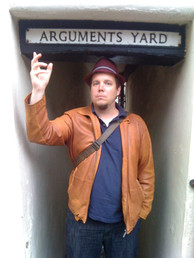About me

Why Rhetoric?
I believe that
Rhetoric
is a verbal martial art concerned with the manipulation of the way members of
an audience perceive their worlds.
Like other martial arts rhetoric is ultimately a peaceful
discipline. Empowering people and spreading
their ability to defend themselves, test positions critically, and interact
more efficiently, leads to less unproductive conflict.
A society with many competent fighters will see less random
brawls, because people who know how to fight do not need to prove themselves
and the bullies who formerly could abuse their powers are now kept in check by
responsible observers.
Teaching rhetorical skills works in a similar manner by
creating more critical citizens who have the ability speak up. Those
critizens
test opposing positions, judge
their merits, and engage in a discussion if they feel the need. As rhetoricians
we will sometimes train a person with who’s position we fiercely disagree –
which is just fine as long as we can make sure that they have an equally well
equipped opponent who defends the ‘right’ position.
I see my main tasks as a rhetorician in attentively
observing verbal conflicts, analyzing the structures of its underlying
reasoning (Argumentation Theory), learning from the most experienced rhetorical
grand masters about human persuasion (Classical Rhetoric) and developing tools
for the effective teaching and training of rhetorical skills (Rhetorical Training).
Short Bio:
I have studied classical rhetoric and philosophy at the
Universities of Tübingen and Barcelona. In 2003 I received my M.A. with highest
honors.
During my undergraduate time I also founded one of Germany’s
first debating clubs, won a number of regional and national competitions and
went on to write the first German debating textbook and train younger debaters,
among them later German champions.
In 2008 I was awarded a Dr. phil. degree
summa cum laude
based on my work on modern stasis theory. I have
since worked as an Academic employee, Postdoc and Lecturer at the University of
Tübingen and Northeastern University.
My research concerns questions in the
intersection of Argumentation Theory, Classical Rhetoric and Rhetorical
Training. I am currently most interested in the felicity conditions of
argumentation and the systematic weak points of reasoning (Argumentation Schemes
and Critical Questions).